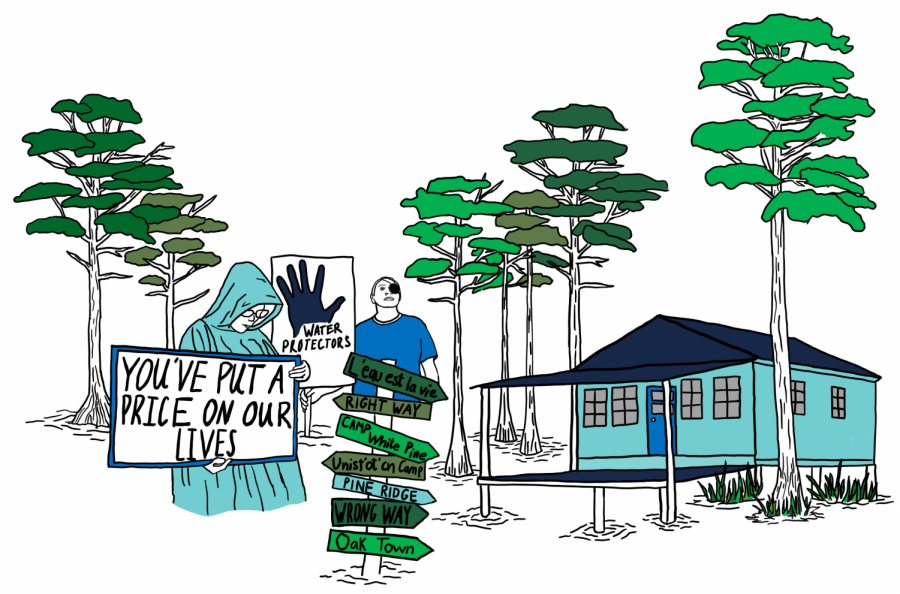Bayou Bridge Pipeline completed, now what?
September 7, 2019
After years of controversy, the construction of the Bayou Bridge Pipeline (an extension of the Dakota Access Pipeline) has finally been completed against the wishes of many in the community and in the nation. The pipeline stretches roughly 163 miles from Lake Charles, LA to St. James, LA, passing through 11 different Louisiana parishes. It also passes through nine different watersheds including the well-known Atchafalaya Basin and Bayou Lafourche. I believe that the construction of this pipeline is both destructive to the much needed natural land of Louisiana and it perpetuates environmental racism.
The impacts of this will be widespread and detrimental to Louisiana’s precious coastline. The completion of the Bayou Bridge Pipeline has permanently destroyed 150 acres of forested wetlands in its path. Not to mention, the pipeline’s 75-foot buffer, along the right-of-way, that has permanently destroyed 940 acres of wetlands. Perhaps this doesn’t sound like a lot of lost land, but there is more life per-acre in wetlands than in almost any other kind of habitat, resulting in a large amount of wildlife being displaced by the destruction of this habitat. To make matters more serious, the wetlands help reduce flooding and damage from hurricanes providing much-needed protection to nearby cities and towns by moving floodwaters and lessening the impact of storm surges. As someone who cares deeply about the environment, the intrinsic value of Louisiana’s wetlands far outweighs many of the oil-related economic benefits that go back into the local community. Seeing as the pipeline could have long-term negative effects on Southern Louisiana’s natural lands and wildlife, it may result in the benefit of the oil business while harming local fishermen who rely on these wetlands. Phillips 66 and Energy Transfer Partners were already responsible for some of the existing harms in Southern Louisiana, and now their pipeline has permanently changed the basin’s landscape. Large corporations need to recognize that not everything has a price tag. When they have this outlook, it leads to the destruction of priceless land and habitats that are necessary for life.
Not only did the pipeline meet resistance because of habitat destruction, but it has also met backlash as it’s a major health concern for the 300,000 people (including the United Houma Nation and residents in Ascension, Assumption, Terrebonne and Lafourche Parishes) whose source of drinking water is inhabited by this pipeline. The sheer amount of oil passing through the pipeline poses a large threat to the residents who depend on this watershed for safe and clean drinking water as a leak could cause irreparable damage. This is especially present in Bayou Lafourche as the pipeline is only 40 feet under the ground compared to other depths of 170 feet and 140 feet in the Atchafalaya Basin and under the East Guide Levee, respectively. The pipeline also passes directly through Houma, Chitimacha and Chata territories. The culture and livelihood of these indigenous communities rely heavily on these lands and watersheds. It is their land and the building of the pipeline has violated their right to that land, similar to the case of the Dakota Access Pipeline.
In the end, everyone and everything in the path of this newly-finished pipeline faces the threat of failures, malfunctions, leaks and spills. Even though the companies involved have given numerous reassurances that the pipeline is safe and uses the best of modern technology, history shows that oil spills still happen, and that the response of the companies involved is rarely as swift as it needs to be. Between the impact on the environment, the cost of cleanup and public health effects from a possible spill, and the infringement of native land, the Bayou Bridge Pipeline is something that we should all be concerned about even if we aren’t directly impacted by it. We all have a duty to stand up for others and this Earth, as there is no one else to do it.








Ellen Byron • Sep 7, 2019 at 6:09 pm
Excellent op ed. Thank you for this.